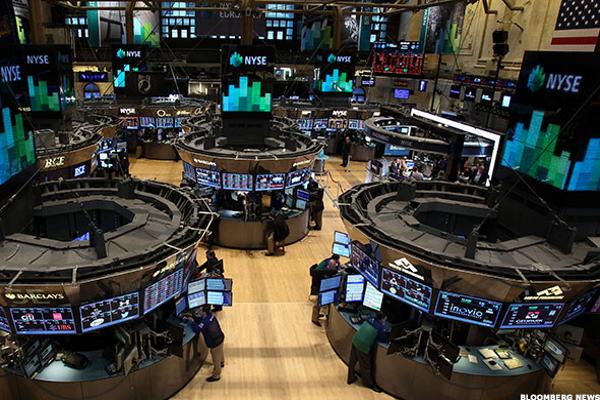Summary of my article in Unlock – link.
Norbert Biedrzycki Head of Services CEE at Microsoft, recently wrote a piece in datadriven investor about how blockchain will transform the stock market. According to Norbert Blockchain can be used by the world’s stock exchanges especially since the govern trades in financial assets has changed little over the past two or three centuries.
He states, “ Today’s investor relies on a traditional system of buying, selling and accounting for transactions that are old enough to be called ossified. The system generates considerable costs and adds to the time needed to close transactions. This is because trading in financial assets requires multiple entities arranged in a complex web of intermediaries, settlement systems and business partners. Whether they are investors, brokers, depositaries, stock exchange management or central supervisory bodies, all actors taking part in asset trading – buying, selling, or transferring – are obliged to generate messages, receive authorizations, and continuously update transaction status records.”
As such blockchain comes in to change transaction processes such as as issuing securities, trading, clearing, and settlements could be handled swiftly and without much friction with the use of blockchain’s distributed ledger.
The fiscal crisis of 2008, triggered (in part) by the proliferation of opaque financial instruments, called into question the transparency of the existing global model. The crash we experienced a decade ago laid bare the need to search for alternative solutions that would help build a more transparent, tamper-proof system. What emerged in the wake of the crash were new government regulations that today, in the U.S., are being rolled back.
Given its properties, he thinks that blockchain would give hope for a stock exchange of the future. In a blockchain-based exchange, murky transactions would become a thing of the past. Smart contracts could dispel doubts as to whether settlements have been made correctly. Supervisory mechanisms – today indispensable, albeit inefficient – would no longer be needed.
He adds, “trust would be a given. Blockchain hits the largest trading floors. The investment market is on the cutting edge of early blockchain deployments. For instance, Nasdaq management has been looking at blockchain for three years. As early as May 2015, the private share-trading platform, Linq, was launched to enable unlisted companies to represent their shares digitally. Last year, Nasdaq Stockholm and the Swedish bank SEB started testing the use of blockchain to register all transactions in real time. Blockchain-based solutions have undergone rigorous testing on the Nasdaq Tallinn exchange. The premise of the project is that corporate shareholders would be able to vote during investor meetings or digitally transfer their voting rights to a proxy.”
In addition The London Stock Exchange Group, in cooperation with IBM, has begun testing a blockchain-based platform to fully digitalize trades in the shares of small and medium-sized enterprises. The tests are being carried out by the Italian operator of LSEG, Borsa Italiana. And the Australian Securities Exchange plans to finish its two-year-long process this year to develop a system that will increase operations transparency and enhance investor security.
His advice to financial institutions is that above all they need to be certain that their customers’ money is secure. It is therefore unsurprising that even given the examples related, capital markets are still slow to embrace blockchain. To see genuine progress, certain conditions must be met, primary among them the establishment of the most stringent security standards for the block system. Blockchain implementations require proper laws. Unfortunately, right now, the legislative environment everywhere is somewhat polarized and inconsistent.
In addition the technology continues to be limited. Work is underway to boost its capacity and reduce transaction costs. On the New York Stock Exchange, there are around three billion trades on a normal day. The development of new platforms to handle such volume is likely to prove complicated and time-consuming. And that translates into costs.
Eventually he believes that stock markets will embrace blockchain.
Link to the article – link
Related articles
– Blockchain poised to shake up our lives
– Will quantum computers doom the blockchain?
– Artificial intelligence is a new electricity
– Why do we care about blockchain technology?










Check Batin
I don’t believe that’s true. Anything Ethereum can do RSK does better and using Bitcoins security model and tokens. RSK is segregated from the main chain giving enormous stability and security advantages versus Ethereum, it also is more intelligently structured enabling disposable chain data and substantially improved scaling. RSK even implements the EVM so the exact same code running an Ethereum contract will run an RSK contract fueled by Bitcoin. RSK has no scammy ICO, no token that can be manipulated, and no sole leader. It is also worth noting RSK has a blockchain, but by relying on Bitcoins security model and network participants that blockchain actually has some modicum of value.
This is an excellent example of the superior approach building in layers is versus altcoins. The features of altcoins are sometimes unique and unavailable from the bitcoin mainchain, but those properties can be safely and securely added via layers. In this way these new features gain the full faith and security of the bitcoin network, its liquidity, access to its participants, and its stability. All without the risk of fraud inherent with an ICO or new speculative token, and with superior scaling properties than using a blockchain. Many layers like Lightning don’t make a new blockchain at all and severely limit their use of onchain activity to scale.
Tom Jonezz
Block chain is a very low-level technology that solves a few recurring software problems very well. It’s exactly like any other design pattern, and yet you would never catch people raging that the Chain of Responsibility pattern will/won’t revolutionise all IT problems and bring about a moneyless utopia.
From what I can tell, bullshit non-technical cryptocurrency speculators began smearing this term all over the technologically illiterate media, whose myriad of incoherent claims about this innocuous software pattern left people raging at the very term “block chain” for failing to live up to the claims made about it.
Good read
Oscar P
While true, trust isn’t solved with block chain, the premise reads as anti-progress: why make something incrementally better if it doesn’t fully solve the problem? I argue many important advances in technology are consistent incremental improvements.
The transparency gained through blockchain’s mechanism positively affects part of the problem space, I think it’s worthwhile to invest in it instead of give up on it.
Zidan78
I thought the selling point of blockchain was an open, verifiable, immatuble history of transactions (or events) that anyone could check themselves.
You couldn’t get some shady repair shop to make up and backdate a service on a car and insert it into the car’s service-history-chain right before selling, for example.
John Accural
While everything you said is true, it is also certainly true that digital currency WILL become a / the norm in the future. The thing is it will be 1 out of thousands of “CryptoCurrency so” vieing for the spot, and it won’t be founded atop block chain.
Zoeba Jones
It’s useless for energy, securities, banks, and currencies. So far, the only application that makes any sense is a single world currency, btc.
Why is it useless for energy? Because energy is government-regulated. All parties are known and trusted.
Why is it useless for securities? Because securities are government-regulated. All parties are known and trusted.
Why is it useless for banks? Because they’re also regulated. All parties are known and trusted.
Blockchain is just a shitty, slow database that you can only write records to, and read records from. You may never change records in blockchain (I’m aware this is an oversimplification and wrong in specific cases/details). The unique advantage of a blockchain database is that it practically solves the two generals problem so you can have a pretty trustworthy distributed database even while a significant portion of counterparties are unknown and/or untrustworthy.
Why would anyone trading securities ever use a blockchain? You already have FINRA, SEC, exchanges, and more. Just have each exchange or a government agency run a much lighter, faster database where you could, if necessary, change entries in the database easily. You’re already trusting these overseers to trade securities, so there’s no need to use a slow-ass decentralized database. In fact, speed is valuable in trading securities, so blockchain is wildly inappropriate!
Why would banks use a blockchain? Well, if you’re laundering money, you should use bitcoin. Otherwise, you should just use a database. It’s faster, cheaper, and you already know and trust your counterparties. Nobody’s identity is secret in legit banking.
TomCat
What this article is saying is that the long term value and application of blockchain itself is minimal. It solves very few existing problems. For most business applications, blockchain is no better than a database or spreadsheet program. Blockchain is a nifty tool in certain niche circumstances, but it’s not the transformative technology it’s being billed – and often valued – as.
AdaZombie
With Bitcoin-BTC the code is holy, the users are irrelevant. (proven by theymos telling 90% of /r/bitcoin to fuck of)
We have seen it with Ethereum classic vs Ethereum. One group was like “the code is holy!, you can’t change the code” the other group was like “fuck that, the code serves the users if we change the code and it serves us better that’s what we will do”
I am in the second camp. Like somebody once told Satoshi: “you won’t find salvation in software”
Satoshi’s answer was: “you are correct but it will give us a powerful weapon for the years to come. ”
I am paraphrasing from memory now. The point is: Bitcoin is just a tool. Don’t worship a tool and don’t believe that a tool by itself can change the world.
SimonMcD
Good read
Adam Spark Two
Great article
ZoraBora
I’m not big on legal questions, but I think doing on NASDAQ what we are doing here would be a financial crime. And the exchanges will have to monitor it that people are not trading with themselves. Otherwise the exchanges will get blacklisted.
And99rew
Yes, absoultelly. But it will take some time
Robert Kaczkowski
Good one 🙂
AndrewJo
Nice. Quoted 🙂
CaffD
I believe the worst is not even the drone’s nature of “follow any orders however evil”, but how easy it will be to start a war. Nowadays (almost) every government faces a strong opposition from the public opinion whenever it’s about to send someone’s daughters and sons to the battlefield. So it’s a decision that must be weighted very carefully (with a view at next elections). What about when (at least at first and/or from one’s side) there’s no human lives involved? There won’t be a moral brake!
ZoraBora
Several U.S. firms seeking regulatory approval to launch a bitcoin exchange-traded fund (ETF), has estimated that 95 percent of bitcoin trading volumes are faked and only 10 exchanges publish reliable data about volumes on their platforms, without inflated numbers.
Oscar P
This is a key point. Smart contracts allow anyone to be trusted because the contract is public and immutable. Smart contracts democratize financial transactions and no one has been able to sufficiently explain to me why that’s a bad thing.
TomaszKik
🙂
TomK
I like to compare Blockchain to solar panels. I remember a few years back when there were people who were going to training classes to learn how to install solar panels so that they could get jobs doing that. Problem is that those jobs never materialized. When somebody wants solar panels they usually just get a general contractor to install them. I think Blockchain is going to be like that. When companies want to implement it they will just get experienced developers and get them trained up on it rather than looking for specialized Blockchain engineers.
Check Batin
It’s foolish to call blockchain “crappy technology”. These networks currently secure billions of dollars, and have never been breached. There are also many brilliant and accomplished developers working on interesting blockchain projects. OP is implying that they are all morons.
Edit: I welcome anyone to prove what I said is incorrect, instead of mindlessly downvoting.
tom lee
Thanks for breaking this down! As I’ve always said in my entire career and fostered in me early on and passionate about it since:
“…Protect the weak from temptation and the strong from corruption…”
Check Batin
As the saying goes, “living and dead … in equal parts” till the box is opened. Good summary
ZoraBora
I think FATF will shut it down quickly: the cryptocurrency exchanges will be regulated like NASDAQ and pumping fake volumes will be banned.